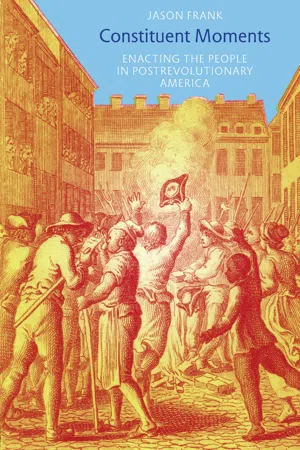
- English
- PDF
- Available on iOS & Android
About this book
Elaborating his theory of constituent moments, Frank focuses on specific historical instances when under-authorized individuals or associations seized the mantle of authority, and, by doing so, changed the inherited rules of authorization and produced new spaces and conditions for political representation. He looks at crowd actions such as parades, riots, and protests; the Democratic-Republican Societies of the 1790s; and the writings of Walt Whitman and Frederick Douglass. Frank demonstrates that the revolutionary establishment of the people is not a solitary event, but rather a series of micropolitical enactments, small dramas of self-authorization that take place in the informal contexts of crowd actions, political oratory, and literature as well as in the more formal settings of constitutional conventions and political associations.
Frequently asked questions
- Essential is ideal for learners and professionals who enjoy exploring a wide range of subjects. Access the Essential Library with 800,000+ trusted titles and best-sellers across business, personal growth, and the humanities. Includes unlimited reading time and Standard Read Aloud voice.
- Complete: Perfect for advanced learners and researchers needing full, unrestricted access. Unlock 1.4M+ books across hundreds of subjects, including academic and specialized titles. The Complete Plan also includes advanced features like Premium Read Aloud and Research Assistant.
Please note we cannot support devices running on iOS 13 and Android 7 or earlier. Learn more about using the app.
Information
Table of contents
- Contents
- Acknowledgments
- Introduction: Constituent Moments
- 1. Revolution and Reiteration: Hannah Arendt’s Critique of Constituent Power
- 2. Crowds and Communication: Representation and Voice in Postrevolutionary America
- 3. Sympathy and Separation: Benjamin Rush and the Contagious Public
- 4. Spaces of Insurgent Citizenship: Theorizing the Democratic-Republican Societies
- 5. Hearing Voices: Authority and Imagination in Wieland
- 6. “Aesthetic Democracy”: Walt Whitman and the Poetry of the People
- 7. Staging Dissensus: Frederick Douglass and “We the People”
- Conclusion: Prospective Time
- Notes
- Bibliography
- Index